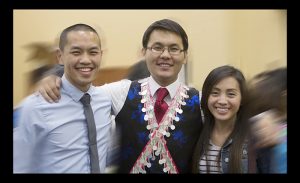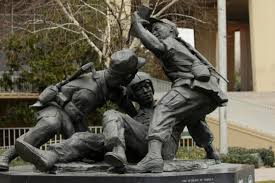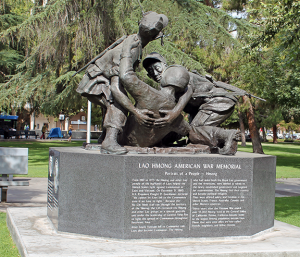
Hmong Americans
“It doesn’t make sense,” West said. “It’s either drug money or it’s not. If it’s not, then give them the money back. Why would someone want to do a 50-50 split? Why are we cutting deals with drug people?” Sheriff Chris West from the Oklahoma Watch article
Shakedown Law Abiding Citizens
The Pirates of I-40
Moua and Chao Yang were driving West on I-40 in a rental car in March of 2009 and were stopped by a Canadian County Deputy for exceeding the speed limit by six miles per hour. In the back was $25,000 in cash, the two men were on their way to a wedding in California. Why so much cash? It is a traditional wedding present in the Hmong tribe, gathered from friends and family members who learned not to trust banks in their native country.
The Yangs gave permission to search the car and the Canadian County Deputy found the cash, claimed it had drug residue on it, and seized the cash for being tied to drug trafficking without ever filing a criminal case against the two men.
The case dragged on four years before Canadian County struck a deal to return half of the cash in return for dropping a lawsuit.
The real problem with these cases is that well meaning efforts to control drug money laundering turn into profit centers for police departments and prosecutor offices without any proof of crimes being committed other than a traffic offense. The traffic offense is used as a pretext for stopping and questioning a vehicle, usually profiled for having out of state tags which most rental cars will have, then probing and probing until the officer finds a pretext to search the vehicle.
Law enforcement officers must have probable cause to stop someone and officers have learned to jump through logical and legal hoops to fabricate suspicions for demanding to search the vehicles.
The other red flag is this; if the money was suspected of being drug money, why return half to the Yangs and why pay off their Oklahoma attorney? As for the drug residue, OSBI testing returned a negative result for any drug residue on the money or on anything from the car.

An American monument to Hmong Tribe warriors in the Vietnam war
The pretext used by the deputy was that California was less than a day’s drive, if you drove 24 hours straight, and the Yangs were allowing themselves four days to make it to the Saturday wedding and stay two days. But how many people are going to drive 24 hours straight or drive across the country and not arrive early to visit or help prepare for the wedding?
In fact there is nothing suspicious about family driving across the country to attend a wedding nor are police even supposed to be asking questions about someone’s travel plans unless there is evidence of a crime for a traffic stop.
Had the men planned on taking stops the approximately 1400 mile journey would have taken two to three days and allowing an extra day before the wedding counted as the planned four day’s time before the event.
After running background checks on the men the deputy found an old assault charge over a fight where the younger Yang had used pepper spray on his assailant. The deputy wrote a speeding ticket and then asked if they were transporting in drugs, weapons, or cash in the car and demanded to search the vehicle after Moua Yang had said there were not drugs, weapons, or cash in the vehicle.
The deputy found the cash, fabricated a claim that the money smelled of marijuana, called out a K-9 unit that “reacted” to the money (they train their dogs to do this on command), but the subsequent OSBI testing showed no evidence of drug residue.
Three days after this lucrative haul the deputy goes before the local County Commissioners requesting permission to purchase $40,000 in new bullet proof vests using money from the Civil Asset Forfeiture fund.
No drugs were found in the vehicle, the Yangs had never had any drug related arrests, and no charges were ever filed other than the speeding ticket.

An American monument to Hmong Tribe warriors in the service of the U.S. Army during the Vietnam war
The cost of defending the lawsuit would have cost far more than the loss of $12,000.00 and law enforcement depends on using tax payer dollars to drag out cases and wear down the rightful owners of the property
.
Since the seizure of the wedding present funds the deputy involved has been vocal in his support of the Civil Asset Forfeiture program and has lashed out against Senator Kyle Loveless’s legislation that would put checks and balances in place regarding seizure and the spending of the stolen cash.
As far as a tool that is used to defeat drug money laundering, the average seizure is around $800.00 here in Oklahoma if you leave out the cases where drugs and money were found in the vehicle.